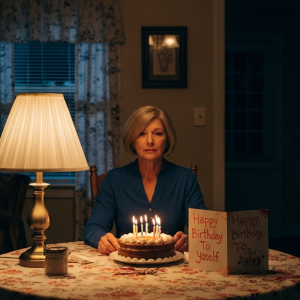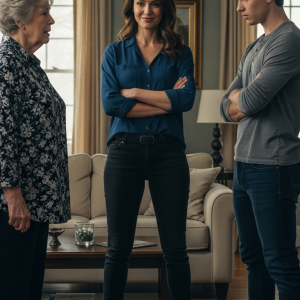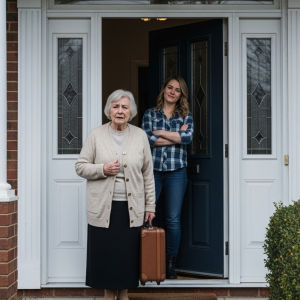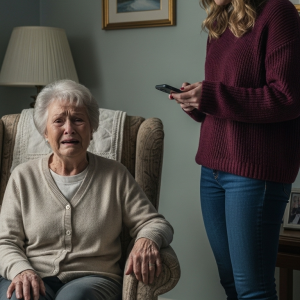She threw me out the day after my son’s funeral, declaring the house was now hers. I remember her laughter during the will reading, a sharp, brittle sound in the quiet office. “Hope you enjoy being homeless, Eleanor.” Then, the lawyer cleared his throat and opened the sealed envelope.
They say the best revenge is living well. I think it’s just letting people reveal exactly who they are, and then handing them the receipt for the damage they’ve caused. It all started with a phone call.
The call came at 3:17 a.m. on a Tuesday, shattering the pre-dawn silence. David’s voice was a ragged whisper, strained and breathless. “Mom… something’s wrong. My chest… I can’t…” The line went dead, replaced by a dial tone that echoed the sudden void in my life.
By the time I reached the hospital, it was too late. My 45-year-old son, my only child, was gone. “A massive coronary event,” the doctor explained with a clinical detachment that felt like a slap. There was nothing they could do.
Stephanie stood beside me in the antiseptic chill of the waiting room. Her face was a carefully constructed mask of shock, but through the cracks, I saw something else flicker in her eyes. Was it relief? No. Surely, my grief was making me see monsters in the shadows.
“What happens now?” I whispered, the words lost in the cavern of my disbelief. David, my vibrant, healthy son, couldn’t just be… gone.
Stephanie straightened her shoulders, her composure a shield. “Now, we deal with reality, Eleanor,” she said, her voice devoid of warmth. “David is gone. And I have decisions to make.” The coldness in her tone was a premonition. David had always been the bridge between us; now that bridge had crumbled, and I was staring into the abyss that separated us.
“Of course, dear,” I managed, reaching for her hand. “We’ll get through this together.”
She pulled away as if my touch burned her. “We’ll see about that.” I should have heard the warning in those words, but I wrote it off as the strange armor of shock. People grieve differently, I told myself. Some shatter; others freeze. Stephanie had frozen solid.
The next three days were a blur of funeral arrangements. I offered to help pay for everything—he was my only son, after all—but Stephanie waved me away with a sharp insistence. “I’m his wife. I know what he would have wanted.”
So I retreated, focusing on his eulogy, calling relatives, and trying to keep myself from dissolving. At sixty-seven, I had buried my parents and my husband, but losing a child was a unique circle of hell, a pain that rewrites your very cells.
The night before the funeral, I sat in what had been David’s childhood bedroom. I stared at the framed photos on his dresser: his college graduation, his wedding to Stephanie, him holding his nephew at Christmas. Then I noticed it—a conspicuous absence. There were no recent photos of David and me. Stephanie had systematically erased me.
A soft knock broke my trance. Stephanie stood in the doorway, the mask of the grieving widow gone, replaced by a cool, calculating gaze. “We need to talk, Eleanor.”
The funeral was, I had to admit, beautiful. The flowers were elegant, the music was perfect, and the reception was flawlessly orchestrated. It was a masterclass in appearances. What wasn’t beautiful was watching my daughter-in-law perform her role, dropping pointed comments about “moving forward” and “new chapters” to sympathetic guests.
Standing in the receiving line, I overheard her talking to her sister near a large floral arrangement. “The life insurance alone will cover the mortgage for two years,” she murmured. “And without the… extra expenses?”
“What about Eleanor?” her sister asked. “Where will she go?”
Stephanie’s laugh was sharp, like glass breaking. “That’s not my problem anymore. She can figure it out like the rest of the world’s adults.” My blood ran cold. I had been living with them for two years, ever since selling my home to help with their down payment. It was meant to be temporary, but temporary had bled into permanent. I had been useful. Now, I was just an expense.
“Eleanor.” Stephanie was suddenly at my elbow, her public smile firmly in place. “Could you help me in the kitchen? There are some things we need to discuss.”
In the kitchen, she closed the door, and the charade ended. “I’m going to be direct,” she said, her voice crisp and business-like. “This house is legally mine now. I need space to process my grief without… complications.”
“Complications?” My voice was steady, a miracle considering the frantic drumming of my heart.
“You living here. It’s not working anymore, Eleanor. I need my privacy.” The words were a physical blow. “Stephanie, I understand, but surely we can—”
“No.” She held up a hand, a final, unyielding barrier. “I’ve made my decision. I’ll give you until tomorrow evening to pack your things. That should be more than enough time.”
I stared at her, searching for the woman David had loved. She was gone, replaced by this cold stranger. “Where do you expect me to go?”
Stephanie shrugged, a gesture of casual cruelty that took my breath away. “You’re a resourceful woman, Eleanor. You’ll figure something out.”
“David would be horrified by this.”
“David’s dead,” she stated, the words flat and final. “And the sooner you accept that, the better off we’ll both be.”
I packed sixty-seven years of my life into four suitcases and two boxes. As I folded clothes and wrapped photos, I kept waiting for her to appear, to apologize, to say she’d spoken from a place of pain. She never came. At 6:00 p.m. the next day, she stood in my doorway, arms crossed. “Time’s up, Eleanor.”
We carried my life to the car in a heavy silence. As I loaded the last box, I turned to her, needing to understand. “I know you’re angry with me. I just wish I knew what I’d done.”
Her expression was unyielding. “You didn’t do anything, Eleanor. You just… exist. In my space. In my way. David felt sorry for you. I don’t.” The brutal honesty was a strange kind of relief.
“I see,” I said, getting into my car. “Will there be a formal reading of David’s will? I assume he left something.”
She looked genuinely puzzled. “Why would he leave you anything? You aren’t his wife. You never contributed a dime to our household.” The irony of that statement, considering the $40,000 from my home’s sale that funded their down payment, was so sharp it almost made me laugh.
I drove away towards the closest hotel I could afford, watching in the rearview mirror as Stephanie stood in the driveway, a solitary figure guarding her new kingdom. In a generic room that smelled of industrial cleaner and quiet desperation, I looked at my reflection. A widow, a childless mother, and now, homeless. But beneath the despair, a different feeling began to stir. Something sharp. Anticipation. Stephanie thought she had won. What she didn’t know was that David had been a far better son than she was a wife.
Two weeks later, as my savings dwindled, a call came from a Mr. James Morrison, David’s lawyer. “Mrs. Fairfield, I’m calling to inform you there will be a formal reading of David’s will next Tuesday. Your presence is required.”
“Required?” I sat up straighter. “I think there’s some confusion. Stephanie seemed to think—”
“Mrs. Fairfield,” he interrupted gently. “I can only tell you what David’s will specifies. And it specifically names you as a beneficiary.”
On Tuesday, I saw Stephanie arrive at the lawyer’s office in a new silver BMW, a man I recognized as her brother, Marcus, in tow. Her face darkened when she saw me. “What is she doing here?” she demanded of the receptionist.
In Mr. Morrison’s mahogany office, the air was thick with tension. He was a kind-faced man, the sort who believed in doing right by his clients. He read the will, and as expected, Stephanie inherited the house, the cars, the retirement accounts, the life insurance. She nodded at each item, glancing at me with triumphant satisfaction.
Then, Mr. Morrison’s tone shifted. “There is, however, one final provision, added just three months ago.”
The atmosphere crackled. Stephanie leaned forward, her eyes narrowed. Marcus put down his pen. I held my breath.
Mr. Morrison read, “To my mother, Eleanor Fairfield, who provided the $40,000 down payment for our home and never asked for its return, I leave the entire contents of safety deposit box E3537 at First National Bank, along with all associated documentation.”
“What safety deposit box?” Stephanie’s voice was sharp.
“Apparently, it was something he maintained privately,” Mr. Morrison said calmly, handing me a sealed envelope. “He was quite specific. The contents are for his mother alone.”
Stephanie’s face was a storm of fury. “This is ridiculous! We’ll contest this!”
In the parking lot, she cornered me. “Eleanor, let’s be reasonable. Whatever’s in that box, we should share it. David would have wanted that.”
For the first time since my son died, I felt a genuine smile touch my lips. “That’s funny. A moment ago, you were certain David wouldn’t have left me anything. Why the sudden concern for sharing?”
Her mask of civility slipped, revealing the cold calculation beneath. “Don’t forget, Eleanor. You’re homeless. You need my goodwill far more than I need yours.”
I paused with my hand on the car door. “Actually, Stephanie, I don’t think I need anything from you at all.”
Three days later, I stood before safety deposit box E3537. The bank manager, a kind woman named Mrs. Peterson, escorted me to a private viewing room. The box was heavy, the size of a briefcase. Inside, the first thing I saw was a letter in David’s familiar script. My hands trembled as I opened it.
Mom, it began. If you’re reading this, then I’m gone. And Stephanie has probably shown you exactly who she really is. I’m sorry for that, but I’m not surprised. I’ve known for years, and I’ve been preparing.
My heart hammered against my ribs as I read on. He wrote about the $40,000 I’d given them. He had never seen it as a gift. For five years, he had been secretly investing it, adding to it whenever he could.
I set the letter down, my hands shaking, and looked at the documents beneath. Bank statements. Investment portfolios. Account numbers. The numbers swam before my eyes, finally settling on a final, unbelievable figure: $185,000.
I picked up his letter again. I also know she tells people you contribute nothing. The truth is, I made sure the mortgage was paid from my salary account. Every penny you gave us for “household expenses” went straight into these investments for your future. I’ve been documenting everything, Mom. Her emails, her texts. It’s all in the folder labeled ‘Documentation.’ You deserve to know who you were living with.
Tears blurred my vision as I opened the folder. It was all there: screenshots of texts, printed emails, copies of credit card statements—years of her deceit, meticulously cataloged.
The final paragraph broke me. You deserve a life where no one can ever make you feel unwanted again. Take this and build it. And Mom… don’t tell Stephanie anything until you are safe and ready. Trust me. All my love, David.
As I walked out of the bank, my phone rang. It was Stephanie, her voice dripping with false sweetness. “Eleanor? I was wondering if you’d like to come by for lunch. We could… discuss what you found.”
I smiled. “That’s very generous, Stephanie. I’ll be there at noon.” It was time for the final performance.
I arrived at her house—her house—at noon sharp. She had set the table with her wedding china, a theatrical display of reconciliation.
“So,” she began after some small talk, “about the box. I know we’ve had our differences, but David would want us to support each other. Family should stick together.”
“Family,” I repeated, sipping my tea. “An interesting concept. I couldn’t agree more.”
She visibly relaxed. “So, about what David left you… I was thinking we could pool our resources. Invest it together. I have some wonderful financial advisors.”
“That’s a kind offer,” I said, setting my cup down. “But what makes you so sure there was anything of value in the box?”
Her smile tightened. “Well, David was so private. He must have had a reason.”
“He did,” I agreed. I reached into my bag and pulled out a small gift. It was a framed photo of David from his college graduation. “I thought you should have this. After all, you were such a… devoted wife.”
The word hung in the air between us. “What’s that supposed to mean?” she asked sharply.
“It means I found the most interesting reading material in that box,” I said, my voice calm. “Financial records. Investment statements. And quite a few printed emails and text messages.”
The color drained from her face.
I pulled out my phone. “David was quite the archivist. For instance, this exchange with your sister from six months ago? ‘God, I can’t wait until that old bat finally moves out. Then we can turn her room into the home gym I’ve been wanting.'”
She lunged for the phone, but I pulled it back. “Or this one, to your brother Marcus, discussing how to convince David I should ‘contribute’ to household expenses, when the mortgage was already paid from his salary.”
“Stop,” she whispered, her voice cracking.
“But my favorite,” I continued, “is the email where you laugh about how gullible I was. How easy it would be to make me feel like a burden, and how you’d already planned to ask me to leave after… well, after David was gone.” I looked at her, my expression one of mild curiosity. “That was rather forward-thinking of you.”
Her composure shattered. “What do you want, Eleanor? An apology? Fine! I’m sorry! Now can we please discuss this money like adults?”
“There’s nothing to discuss.”
“Of course, there is! If he left you a significant sum, I can help you manage it!”
“You mean you can help me spend it,” I corrected gently. “Stephanie, let me be clear. This isn’t an inheritance. It’s the return on an investment. The $40,000 I gave you for your down payment.”
Her mouth fell open. She had either forgotten or chosen to rewrite history. “How much?” she finally whispered. “How much is it worth now?”
I opened my banking app and turned the screen toward her. The balance, $185,000, glowed in the dim light of the dining room.
She went white, gripping the table to steady herself. “That’s… that’s almost as much as the life insurance. That money should be part of the estate! I’m his wife!”
“And I,” I said, my voice soft but firm, “am ‘just his mother.’ The woman who gave birth to him, raised him, and gave him the money for the house you just threw me out of.” I stood and slung my purse over my shoulder. “And it turns out, that was more than enough for David. He made sure I would never have to depend on anyone’s charity again.”
“Wait,” she cried as I walked to the door. “Please, we can work this out!”
I turned back one last time. From my folder, I pulled out a final document. “Did you know David also documented your spending? The $15,000 in credit card charges the month before he passed? Spa treatments, designer clothes, a weekend in New York… all while telling him you were worried about money for groceries.”
She collapsed into her chair, the fight finally leaving her. “I can’t lose everything,” she sobbed.
“You aren’t losing everything, Stephanie,” I said, my voice devoid of pity. “You have the house, the insurance, the retirement funds. You are losing only one thing: the illusion that you were ever entitled to mine.”
I left her there, a queen in a kingdom of her own making, surrounded by beautiful things that could never fill the void of her character. I walked out into the sunshine of my new beginning.
Sometimes, the best revenge isn’t revenge at all. It’s justice. And if you’re very lucky, it comes with the quiet knowledge that the child you raised became exactly the man you hoped he would be. Even from beyond the grave, my son had kept his word. And that was the greatest inheritance of all.




